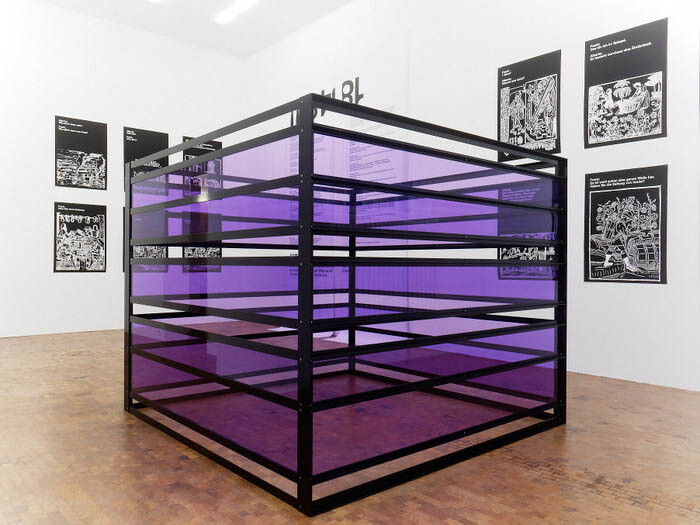With an exhaustive monographic exhibition currently on show in Bonn, a lengthy touring retrospective recently over, and last year’s opinion-dividing outing in the Venice Biennale’s German Pavilion, not to mention the reams of printed matter and symposia that make up the productive phenomenon that is Liam Gillick, what can a small-scale gallery show have to offer?
“Three key components” of Gillick’s work, or so the press release tells us: “The beginning of a new research process; the re-presentation of an event and a new physical structure.” That the three components themselves appear baffling (at least to the uninitiated) is not unusual with Gillick’s work. It is essentially a given that the visible works, despite their glossy physical character, function rather as stand-ins for a discourse going on elsewhere: a broad, circling, theoretical mesh of questions, quotations, references, and collaborations. Although it is true to say that the exhibition consists of a series of black-and-white inkjet prints, an aluminum and Plexiglass structure, a large paper banner advertising a film, and a film projected large, this fact, it seems, largely misses the point.
This situation is immediately apparent when faced with the works themselves. Each of the black-and-white prints, for instance, combines an image from a medieval woodcut with a fragment of German dialogue in bold Helvetica type (Bar “Volvo,” 2010). The conversation between “Alberto” and “Frank” that unravels across the series of 16 prints initially seems to approach the “man goes into a bar” genre of joke telling, but the joke fails to materialize. Instead we have a sequence of temporal jolts, with references shifting from “Altes Bier” to “Bacardi Breezers,” effecting a kind of slow-motion flashback, a coiling time tunnel that problematizes the already tenuous links between image and text. Resolution between the two is impossible to reach. The text, as it turns out, is as secondhand as the images, borrowed from a play titled “A ‘Volvo’ Bar” that Gillick developed for the Kunstverein Munich as part of his retrospective. Here it is essentially an interloper, pointing to a seam of previous production.
Similarly, the film 1848!!!, despite its high precision allure, and compelling imagery (consisting almost entirely of full screen close-ups of an attractive young narrator) is an exercise in audience frustration: we cannot hear the words the narrator speaks, nor see to whom she speaks, and hear only a repetitive electronic soundtrack. That the words she is speaking are those printed on the large paper banner in the show is impossible to know without resorting to the press release. The text on the banner details chronologically the revolutionary events across Europe between 1846 and 1849 (predicting the past, disconcertingly, in the future tense), but inaudible in the film, they are as ungraspable as the events themselves are unreachable, across history’s yawning temporal, and social, abyss.
Slippage and ellipsis are the defining operatives of Gillick’s practice and whether you find this irritating or invigorating is largely a question of commitment. Following up the various proffered leads is a time-consuming process, and its circular route of references seems to lead inevitably to the artist’s own texts: his prolific and often impenetrable outpourings which, nonetheless, contain nuggets which are illuminating, and not only of his work. Slick on the outside and fraught with irresolution within, Gillick’s works fling open doors all around them to let in crosswinds of conundrum and dissent. The show in Bonn, he says, has to do with “a desire to start at the wrong end and work backwards. Keep walking in circles or even taking the same route more than once.” Those in the mood for a meandering walk can do worse than to start off here.




